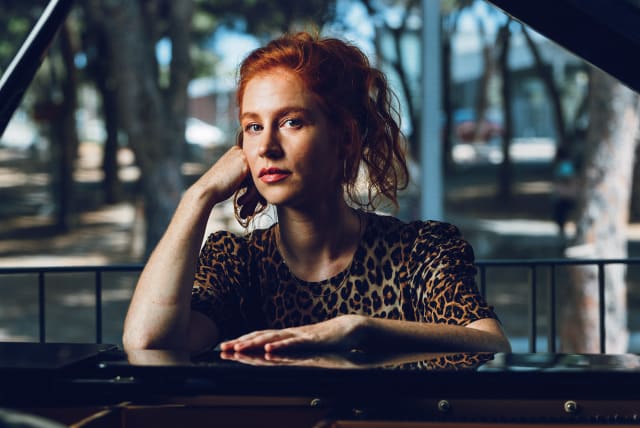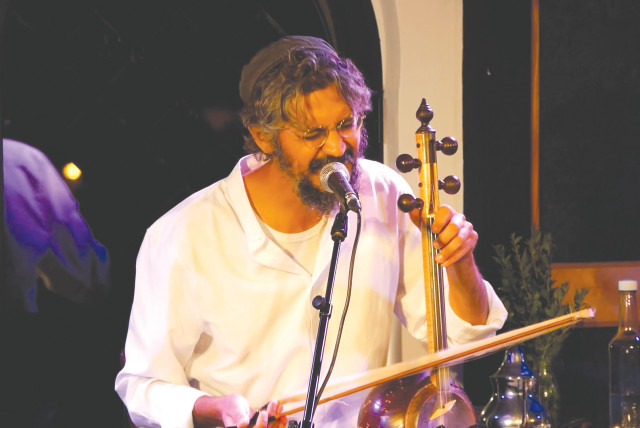Darya Mosenzon – from classical piano to Morocco

How the pianist Darya Mosenzon came to specialise in Moroccan music.
By coincidence, Darya Mosenzon and I met the week that Maurice El Medioni died at the age of 95. Medioni was an Algerian-Jewish pianist who introduced a new style of playing piano that married the flavors of Andalusian music with the freer forms of jazz and even pop.
The 34-year-old Mosenzon, a classically trained pianist, was drawn to this music beforehand, but the influence of Medioni was critical in her development
“I got to know him when he was already 90. He had immigrated to Israel after having played in Paris and, before that, in Algeria,” she said. “His music has been part of my inspiration for a long time and almost every day I play pieces that he wrote. He was part of my life before I personally got to know him but the percussionist, Hillel Amsallem, who plays with my trio, used to play in Maurice’s band. It was through Hillel that I got to meet him and his family and feel very lucky to have sat down with him; and get to know him.”
From Ashkenazi to the music of North Africa
Mosenzon’s own musical career started much earlier and under very different influences. Her fiery red hair more than hints at the revolutionary style of her music. Born and raised in Tel Aviv, she was schooled in classical Western music but found herself attracted to North African music. For the last decade or so, she has devoted herself to absorbing it to the extent of creating her own original compositions. This music has taken her to Europe and Morocco.
“I had been studying classical piano since the age of five. But as I grew older I felt that there was something missing in the music I was playing. Some of my friends were studying with Elad Levy – who was the musical director of the Andalusian Orchestra of Ashdod and was, himself, an exceptional violinist. They played me some of the music that Elad had given them to practice with. When I heard it I thought it was the most beautiful music ever. I decided that I would put aside everything else I was doing and study Moroccan music,” she said.
She began with Levy and then continued with musicians she met in Tetuan in the north of Morocco, where they teach piano in the classical Moroccan tradition.
“I later met Omri Mor in Israel and was able to pursue more of the Algerian piano tradition. I didn’t study with Maurice, but I did meet with him and learned from him through his music,” she said.
Mosenzon added that the transition from one tradition to another took many hours of listening and practicing.
“I’m still learning all the time. Like any good thing, it’s never-ending. Everything is different about it: the method, the music, the way they treat the piano. It was like learning to play a new musical instrument.”
She thinks that the piano – which is not a native instrument in North Africa – was probably introduced by the French occupation 100 years ago or more. “The school in Morocco where I studied began maybe in the 40s or 50s, relatively not that long ago.”
“Although it’s an oral tradition, there are specific ways to play the tradition with a repertoire that has been around for hundreds of years. I learned it through listening – playing and listening. I really enjoy the liveliness that comes with this half-improvised, half-traditional way. There’s something very strong in learning music by listening, by singing and feeling the music through your body.”
That this type of Oriental music has been accepted more and more by the Israeli [and Western} public is evidenced in that there are more places to perform, both inside Israel and abroad. Darya is very much part of this new wave, mixing modern tropes with an ancient style of music.
“I feel like I’m on the shoulders of giants. Even so, there is a lot more to be done to give this music the space it deserves.”
One wonders what her Ashkenazi family think of this revolution?
“They have been very supportive. My grandmother was a classically trained pianist, yet she understood what was missing for me in classical music that I found in Moroccan music. In the last few months of her life, she would ask me to play only my original music for her.”
Next week, Mosenzon and her group, including Charlie Saba on oud and vocals, and Hillel Amsallem on percussion will be performing songs from their debut album in a special performance at Levontin in Tel Aviv as part of their International Piano Day festival.
Jerusalem Post Store
`; document.getElementById("linkPremium").innerHTML = cont; var divWithLink = document.getElementById("premium-link"); if (divWithLink !== null && divWithLink !== 'undefined') { divWithLink.style.border = "solid 1px #cb0f3e"; divWithLink.style.textAlign = "center"; divWithLink.style.marginBottom = "15px"; divWithLink.style.marginTop = "15px"; divWithLink.style.width = "100%"; divWithLink.style.backgroundColor = "#122952"; divWithLink.style.color = "#ffffff"; divWithLink.style.lineHeight = "1.5"; } } (function (v, i) { });

